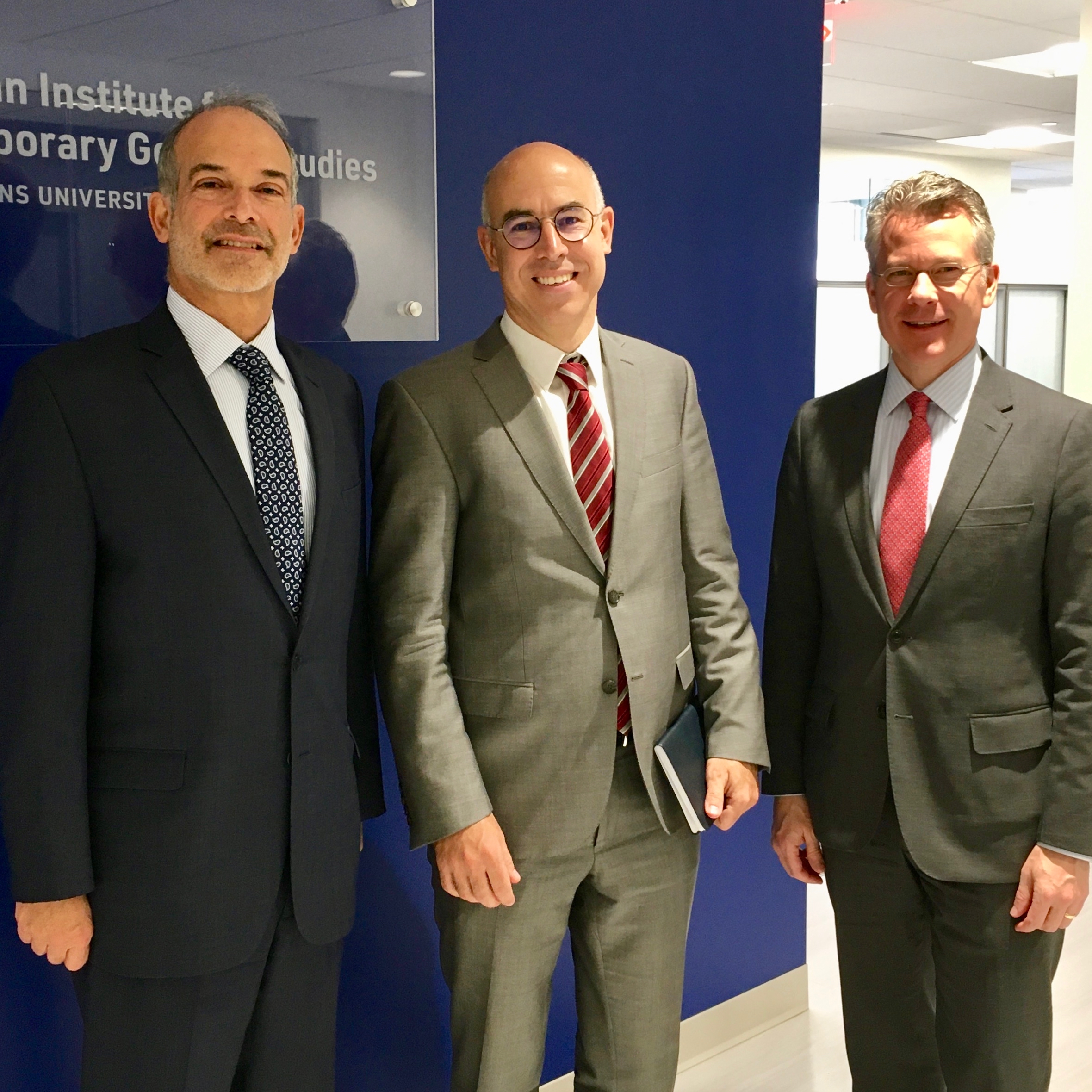Episode 16: Renewal or Reversal in the Transatlantic Trade Relationship

Gabriel Felbermayr
Austrian Institute of Economic Research
Gabriel Felbermayr has been Director of the Austrian Institute of Economic Research (WIFO) in Vienna and university professor at the Vienna University of Economics and Business (WU) since October 1, 2021. After studying Economics and Trade at the University of Linz, he went to Florence, Italy, to pursue his doctoral studies. From 2004 to 2005, he was an Associate Consultant with McKinsey & Co. in Vienna. From 2005 to 2008, he was Assistant Professor at the University of Tübingen. From 2009 to 2010, he held a chair in International Economics at the University of Hohenheim (Stuttgart). From 2010 to 2019, he led the ifo Center for International Economics at the University of Munich, where he also served as a full professor in International Economics. From 2019 until September 2021, he was President of the Kiel Institute for the World Economy and held a chair in Economics and Economic Policy at Kiel University (CAU). Gabriel Felbermayr holds various roles and positions, including Member of the Scientific Advisory Board of the German Federal Ministry of Economics and Energy, Chairman of the Statistics Council of the Statistics Austria Federal Institute, and Associate Editor of the European Economic Review. His research and consulting work focuses on issues of international trade theory and policy, labor markets, European economic integration, and current economic policy issues.

Jeff Rathke
President of AGI
Jeffrey Rathke is the President of the American Institute for Contemporary German Studies at the Johns Hopkins University in Washington, DC.
Prior to joining AICGS, Jeff was a senior fellow and deputy director of the Europe Program at CSIS, where his work focused on transatlantic relations and U.S. security and defense policy. Jeff joined CSIS in 2015 from the State Department, after a 24-year career as a Foreign Service Officer, dedicated primarily to U.S. relations with Europe. He was director of the State Department Press Office from 2014 to 2015, briefing the State Department press corps and managing the Department's engagement with U.S. print and electronic media. Jeff led the political section of the U.S. Embassy in Kuala Lumpur from 2011 to 2014. Prior to that, he was deputy chief of staff to the NATO Secretary General in Brussels. He also served in Berlin as minister-counselor for political affairs (2006–2009), his second tour of duty in Germany. His Washington assignments have included deputy director of the Office of European Security and Political Affairs and duty officer in the White House Situation Room and State Department Operations Center.
Mr. Rathke was a Weinberg Fellow at Princeton University (2003–2004), winning the Master’s in Public Policy Prize. He also served at U.S. Embassies in Dublin, Moscow, and Riga, which he helped open after the collapse of the Soviet Union. Mr. Rathke has been awarded national honors by Estonia, Latvia, and Lithuania, as well as several State Department awards. He holds an M.P.P. degree from Princeton University and B.A. and B.S. degrees from Cornell University. He speaks German, Russian, and Latvian.
__

Peter S. Rashish
Vice President; Director, Geoeconomics Program
Peter S. Rashish, who counts over 30 years of experience counseling corporations, think tanks, foundations, and international organizations on transatlantic trade and economic strategy, is Vice President and Director of the Geoeconomics Program at AICGS. He also writes The Wider Atlantic blog.
Mr. Rashish has served as Vice President for Europe and Eurasia at the U.S. Chamber of Commerce, where he spearheaded the Chamber’s advocacy ahead of the launch of the Transatlantic Trade and Investment Partnership. Previously, Mr. Rashish was a Senior Advisor for Europe at McLarty Associates, Executive Vice President of the European Institute, and a staff member and consultant at the International Energy Agency, the World Bank, UNCTAD, the Atlantic Council, the Bertelsmann Foundation, and the German Marshall Fund.
Mr. Rashish has testified before the House Financial Services Subcommittee on International Monetary Policy and Trade and the House Foreign Affairs Subcommittee on Europe and Eurasia and has advised three U.S. presidential campaigns. He has been a featured speaker at the Munich Security Conference, the Aspen Ideas Festival, and the Salzburg Global Seminar and is a member of the Board of Directors of the Jean Monnet Institute in Paris and a Senior Advisor to the European Policy Centre in Brussels. His commentaries have been published in The New York Times, the Financial Times, The Wall Street Journal, Foreign Policy, and The National Interest, and he has appeared on PBS, CNBC, CNN, NPR, and the BBC.
He earned a BA from Harvard College and an MPhil in international relations from Oxford University. He speaks French, German, Italian, and Spanish.

The trade relationship between the United States and the European Union has been called into question during the Trump administration, despite research showing that U.S. trade with the EU is, on the whole, balanced. Why is that contrary to the intuitive understanding of many Americans? One factor is that the trade relationship is not only about trade in goods; it is also about trade in services. In services, the U.S. economy has a comparative advantage. In fact, overall in 2018, the U.S. ran a current account surplus with the EU of $14 billion—a surplus that has been going on since 2009. The economic relationship is essentially balanced.
There is also the question of singling out Germany—which is problematic because Germany is part of the European single market. In looking at U.S.-German statistics, there is essentially no services trade in the bilateral relations because it’s all in Germany’s trade relationship with Ireland, within the EU, where many U.S. companies base their subsidiaries. In short, we cannot understand transatlantic trade without looking at the entire trade relationship.
On this episode of The Zeitgeist, Jeff Rathke and Peter Rashish speak with Professor Gabriel Felbermayr, one of Germany’s leading trade economists whose contributions to the transatlantic debate on trade deficits have gained wide attention.
Other episodes in the Allianz Geoeconomics Speaker Series
Episode 6: Competing Visions for a New Era of Globalization
Episode 11: Inequality and Social Division: An Economic Perspective
Host
Jeff Rathke, President, AGI
Guests
Gabriel Felbermayr, President, Kiel Institute for the World Economy
Peter Rashish, Senior Fellow and Director of the Geoeconomics Program, AGI
Prof. Felbermayr also spoke at AGI about “The United States, Germany, and Global Trade: Renewal or Reversal?” as part of our Geoeconomics Speaker Series, kindly supported by Allianz.







